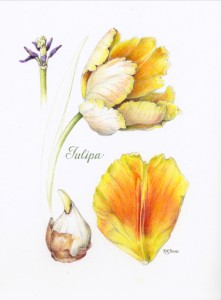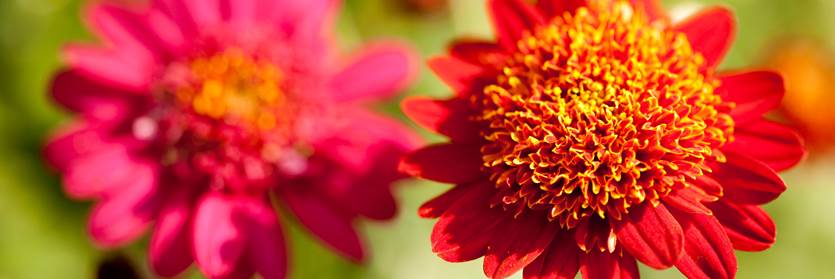Slow Art Is Like Slow Food—It’s for the Soul
Posted in Learning Experiences on June 8 2010, by Plant Talk
See Life More Leisurely Through Botanical Illustration Study
 |
Rose Marie James is an instructor in the Garden’s Botanical Art and Illustration program. |
 What started me thinking about what I call “slow art” is my affinity for “slow food” (I must confess to a McDonald’s fix on occasion). Engaging in the preparation of food is a more meaningful experience for me than driving through a pick-up window or popping something into the microwave.
What started me thinking about what I call “slow art” is my affinity for “slow food” (I must confess to a McDonald’s fix on occasion). Engaging in the preparation of food is a more meaningful experience for me than driving through a pick-up window or popping something into the microwave.
Knowing what a bean looks like before it gets cut up, handling a whole head of lettuce that needs washing and tearing into bite-size pieces, trimming the greens and roots from a beet before cooking remind me that I am connected to and rely on plants to thrive. Additionally, eating food that is carefully prepared is both satisfying and delicious.
That same kind of connection between process and result is the reason I love working as a botanical artist, and have, therefore, come to see it as “slow art.”
It contrasts with the work I have done as a graphic designer in promotional advertising, where everything has to be done in a hurry. Using the computer to this purpose just amplifies the frenzy, leaving time for little but making things look good.
Technology speeds us through more information than we can possibly absorb. (I, myself, own three iPods, three computers, and a cell phone.) Yet, we have come to be lost without them. Alternately, botanical illustration gives me time to reflect, and I am drawn to the fulfillment I feel when creating it. It slows me down.
Producing a piece of botanical art requires the artist to study the subject carefully, to learn how it grows, how it reproduces, and how it nourishes itself. Discovering these details, the grace and genius inherent in a plant’s anatomy, and transforming it into art brings us back to the real world growing around us.
Traditional drawing methods used by artists for centuries further slows the process. Pencils, paint, paper, eyes, and hands are the tools used to create the work. And, like “slow food,” the process becomes as important as the result. Slow art requires time. It is not created in a heartbeat or the click of a mouse. Just as “slow food” nourishes the body, botanical art, slow art, nourishes the soul.
I will be teaching Drawing at the Botanical Garden’s new Midtown Education Center this August. I hope you will attend and discover a love of botanical illustration, or what I like to think of as “slow art.”
Register now for Rose Marie James’ courses and other Botanical Art and Illustration offerings.


Hello Rose…. A.K.A. Mrs. James :
That was very well spoken and I couldnt agree with you more. Your work is amazing, no surpirse there. I wish I was down state to take your summer class.
My new interest this year is sunflowers. I would like to build a collection of worked based on them. Im not sure what direction to go yet. Im torn between abstract and realism. My creative energy is flowing and perhaps once I hit the canvas things will just happen. The one thing I know for certain is the sunflower, and why I have know idea, its a subject that keeps coming to me over and over.
I hope one of these days we can meet up again. You were a great mentor back in 1983, and the thing that goes over in my head is to draw what I see and not what I think I see. You should write a book about your artist journey. Youre a fantastic writer. Best of luck with teaching, your students will learn a lot! Michael Sagnibene